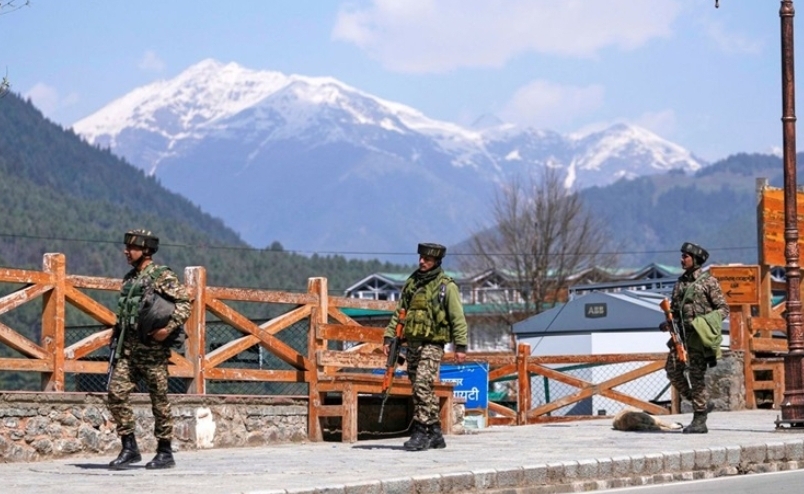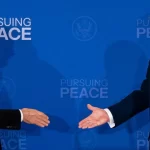
India’s Defence Industrial Mindset needs a Rethink - From Catching Up to Getting Ahead
November 25, 2025

Blog

India’s Response to the Pahalgam Massacre – Options and the Road Ahead
Posted by admin
The Pahalgam massacre is a brutal reminder that terrorism remains a central challenge to India’s national security. India’s options range from water diplomacy and international isolation of Pakistan to covert and overt military action. A full-scale war, though emotionally satisfying for some, may not be the wisest course. Instead, a combination of diplomatic pressure, water control, and precision strikes offers a more effective and responsible path.
The recent Pahalgam massacre, carried out by Pakistan-sponsored terrorists, has once again brought the focus back on India’s response to cross-border terrorism. With the Prime Minister authorising the armed forces to respond as deemed fit, a key question arises – what are India’s options, and what response will best serve national interests without escalating into an uncontrollable conflict?
While some immediate measures have already been taken, others are being kept under wraps. Let us examine the key response strategies under consideration from economic and diplomatic moves to military and technological actions and assess their impact and feasibility.
Putting the Indus Waters Treaty on Hold. One of the most significant announcements following the massacre was India’s decision to suspend the Indus Waters Treaty, a water-sharing agreement signed with Pakistan in 1960 under World Bank mediation. The treaty grants Pakistan access to the western rivers (Indus, Jhelum, and Chenab), while India retains control over the eastern rivers (Ravi, Beas, and Sutlej).
India, as the upper riparian state, has always respected the treaty despite repeated provocations. However, the government has now indicated that this goodwill cannot continue unconditionally. Blocking or significantly diverting western river waters would require long-term planning, construction of dams, and international legal considerations. But India does have the ability to regulate water flow to a limited extent even now, enough to create pressure on Pakistan’s already fragile agricultural and economic system.
While this is not an immediate solution, it serves as a strong signal of intent. Over time, reduced water flow could affect Pakistan’s food security and industry, compelling a rethink of its support to terror outfits.
Diplomatic Isolation of Pakistan. India has intensified its diplomatic offensive. The goal is to expose Pakistan’s continued support to terrorism and isolate it globally. Pakistan’s track record in this regard is already poor, with multiple countries and international bodies acknowledging its role in harbouring terror groups like Jaish-e-Mohammed and Lashkar-e-Taiba.
This strategy of building global pressure helps in several ways. First, it damages Pakistan’s credibility and economy. Second, it strengthens India’s moral high ground and prepares the ground for any future action, whether military or economic. Already many countries have expressed sympathy and solidarity with India, and some have even supported stricter international scrutiny of Pakistan. The latest statement from the US VP, JD Vance states “We hope, frankly, that Pakistan, to the extent that they’re responsible, cooperates with India to make sure that the terrorists sometimes operating in their territory are hunted down and dealt with”.
Conventional Military Action. Understandably, there has been strong public sentiment in India demanding a military response. Pakistan’s use of terror as a state policy is not new and each such incident pushes public patience to its limits.
However, a full-scale war is a high-cost option. India is a rising economy with strategic ambitions, growing infrastructure, and global partnerships. A prolonged war could derail these efforts and set back development goals. Wars have unpredictable outcomes. Even if India inflicts heavy damage, Pakistan, a nuclear-armed state, might escalate dangerously, or use the situation to increase military control internally. Ironically, war might even benefit the Pakistani military establishment, which often uses external threats to maintain its hold over civilian institutions and justify its budget. This thus seems like an ‘unlikely’ option notwithstanding the popular mood.
Technology-Enabled Precision Strikes. This brings us to a more balanced option – technology driven precision strikes. India has already used such methods in the past, for example, the 2016 surgical strikes and the 2019 Balakot air strike. Both were designed to punish terrorist infrastructure without entering into a full-scale war.
However, Pakistan has since moved many of these terror camps and made them harder to detect. That said, advances in surveillance including satellite imagery, electronic interception, drones, and AI-powered reconnaissance offer India the ability to track and target with minimal collateral damage. A strike using unmanned aerial vehicles (UAVs), loitering munitions, or standoff weapons can send a strong message. It signals resolve, disrupts terror operations, and reassures the Indian public, all while avoiding open war. In such a scenario, however, a countervailing action by Pakistan with help from allies like China and Turkiye will have to be countered by Indian defence forces.
In this era, wars are not only fought on the battlefield (read our blog on Mindspace). Cyber-attacks, electronic warfare, and precision drone strikes are becoming new instruments of deterrence. India’s growing tech capabilities offer a smarter way to respond hard and decisively.
India must maintain pressure in all spheres to include economic, diplomatic, and strategic, while keeping escalation in check. That is how a mature, confident nation responds – with strength, wisdom, and long-term vision.
Col Ashwani Sharma (retd), Editor
5 Replies to “India’s Response to the Pahalgam Massacre – Options and the Road Ahead”
Leave a Reply
Search Blog
Categories
Popular Posts







A very sound mature analysis.
Nations don’t go to war based on reporters and some self styled defence analysts.
Pakistan has kept us engaged in J&K where it has the advantage of sharing the boundary and absolute Muslim majority in Kashmir and cultivate OGWs. Though Pak has sustained the insurgency in J&K for decades, India has not been sleeping. It is/has also managed to weaken Pakistan from within. Our ability to bear what is/has happened in Kashmir is far greater than Pakistan ability to avoid internal implosion. How we orchestrate this without going to war is superior strategy and I am certain the Govt is capable of executing it.
Odd tactical( local) actions will /may be taken to project masculinity of present government. Bigger game is likely to be strategy of indirect approach and not conventional war to be initiated by us. Pakistan may start war when it is can’t bear the pain over time caused by our strategy of indirect approach as covered very aptly in this article.
India needs to get back to basics with the situation in Kashmir. The best move would’ve been a quick, smart response – sending out a few drones to track down the culprits fast. Instead, we’ve seen a slower, old-school approach without much tech in the mix. Seems like the government gets that things need to change, which is why they’re going for a calm, thought-out strategy instead of just hitting back hard. Give it a couple of years, and attackers will likely face a much sharper, tech-savvy opposition.
A balanced analysis
You have articulated both the short term – to assuage the national emotions, and more importantly the longer and more effective straglehold which should degrade their abilities. Maintaining favourable cost benefit ratios for india
Precision strikes, that’s the option taken.
Some big heads on the terrorist leaders’ list also need to roll, for the right impact.
It has taken 15 years to go after muridke and Bahawalpur after it was brought out at an appropriate forum that terrorists needs to be taken out irrespective of IB/Loc and now CFL consideration
They possess no nationality
Abrogation of Shimla agreement gives us the right to consider the punitive action anywhere and anytime against those who cause pain and suffering and those who provide shelter
IB turns irrelevant in this case but yes Ashwini you are right that the response has to be calibrated and proportional with an aim to deter future strikes on Indian soil